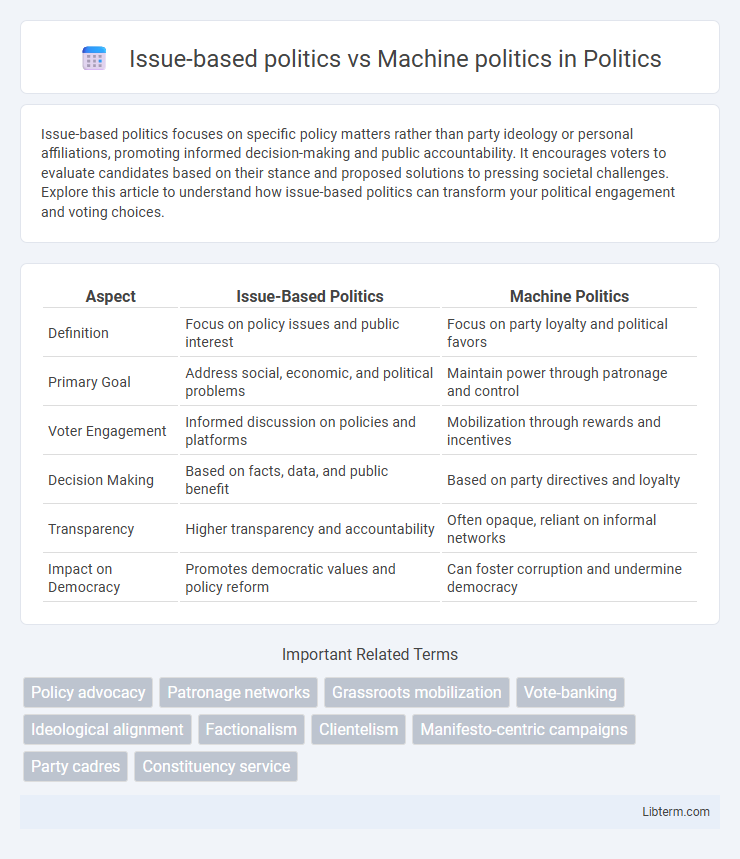Issue-based politics focuses on specific policy matters rather than party ideology or personal affiliations, promoting informed decision-making and public accountability. It encourages voters to evaluate candidates based on their stance and proposed solutions to pressing societal challenges. Explore this article to understand how issue-based politics can transform your political engagement and voting choices.
Table of Comparison
| Aspect | Issue-Based Politics | Machine Politics |
|---|---|---|
| Definition | Focus on policy issues and public interest | Focus on party loyalty and political favors |
| Primary Goal | Address social, economic, and political problems | Maintain power through patronage and control |
| Voter Engagement | Informed discussion on policies and platforms | Mobilization through rewards and incentives |
| Decision Making | Based on facts, data, and public benefit | Based on party directives and loyalty |
| Transparency | Higher transparency and accountability | Often opaque, reliant on informal networks |
| Impact on Democracy | Promotes democratic values and policy reform | Can foster corruption and undermine democracy |
Understanding Issue-Based Politics
Issue-based politics centers on policy debates and public concerns, emphasizing voter needs and transparent governance. It encourages informed citizen participation by focusing on specific issues such as healthcare, education, and environmental policy rather than party loyalty or patronage. This approach fosters democratic accountability and aligns political outcomes with the electorate's priorities.
Defining Machine Politics
Machine politics refers to a political system where a centralized organization, often led by a party boss or political boss, controls elections, government appointments, and distribution of resources through patronage and vote-buying. This system prioritizes loyalty and maintaining power over addressing specific public policy issues, relying on a network of supporters who deliver votes in exchange for favors or government jobs. Machine politics contrasts with issue-based politics by focusing more on organizational control and sustained political dominance than on policy debates or ideological positions.
Historical Evolution of Political Strategies
Issue-based politics emerged prominently in the late 19th and early 20th centuries, emphasizing policy debates and public interest over personal loyalties, driven by the rise of mass media and educated electorates. Machine politics, rooted in urban centers during the 19th century, relied on patronage, loyalty networks, and control of immigrant votes to secure political power. Over time, the historical evolution of these strategies reflects a shift from clientelism and personalism toward more programmatic and ideological political engagement.
Key Differences Between Issue-Based and Machine Politics
Issue-based politics centers on policy debates and addressing public concerns with transparent platforms, prioritizing voter interests and accountability. Machine politics relies on hierarchical party organizations that exchange votes for favors, often emphasizing loyalty and patronage over policy substance. The key differences lie in voter engagement, transparency, and the role of ideology versus patronage in political decision-making.
Impact on Voter Engagement and Participation
Issue-based politics fosters higher voter engagement by directly addressing the concerns and policy preferences of the electorate, leading to more informed and motivated participation. Machine politics, relying on patronage and party loyalty, often diminishes genuine voter involvement by focusing on loyalty over substantive issues. Consequently, issue-based politics tends to enhance democratic responsiveness and accountability, whereas machine politics may perpetuate voter apathy and transactional voting behavior.
Role of Political Parties in Both Systems
Political parties in issue-based politics prioritize policy platforms and voter concerns, fostering transparency and accountability by aligning party agendas with public interests. In machine politics, parties operate as hierarchical organizations focused on maintaining power through patronage, often relying on vote mobilization and clientelist networks rather than policy debates. The contrasting roles underscore parties as either vehicles for ideological representation or instruments of political control and resource distribution.
Case Studies: Examples from Global Politics
Issue-based politics prioritizes policy discussions and voter concerns, exemplified by the 2008 U.S. presidential election, where Barack Obama's campaign centered on healthcare reform and economic recovery. Machine politics relies on organized party structures and patronage systems, as seen in New York City's political machines like Tammany Hall, which maintained power through voter mobilization and loyalty networks. India's political landscape demonstrates a blend, with regional parties often using patronage systems while focusing on caste-based and development issues to secure electoral support.
Advantages and Disadvantages of Each Approach
Issue-based politics centers on policy discussions and candidate positions, promoting voter awareness and informed decision-making, yet it may alienate individuals lacking political knowledge or resources to engage deeply. Machine politics relies on organized party structures and patronage systems, offering efficient mobilization and voter turnout, but often leads to corruption, patronage, and reduced emphasis on substantive policy debate. Both approaches shape democratic participation differently, with issue-based politics fostering ideological engagement while machine politics prioritizes practical electoral success.
Influence on Policy Development and Governance
Issue-based politics centers on policy development driven by public concerns and evidence-based solutions, fostering transparency and accountability in governance. Machine politics relies on party loyalty and patronage networks, often prioritizing political survival over substantive policy-making. The influence on governance differs as issue-based systems promote informed decision-making, while machine politics can result in clientelism and reduced policy effectiveness.
The Future of Political Campaigning
Issue-based politics emphasizes policy discussions and voter education, leveraging data analytics and targeted messaging to engage constituents on specific concerns. Machine politics relies on party loyalty, patronage, and organizational control, often using grassroots mobilization and voter mobilization technologies. The future of political campaigning will increasingly integrate sophisticated digital tools to blend issue-focused outreach with efficient voter targeting mechanisms, enhancing campaign effectiveness and personalization.
Issue-based politics Infographic

 libterm.com
libterm.com